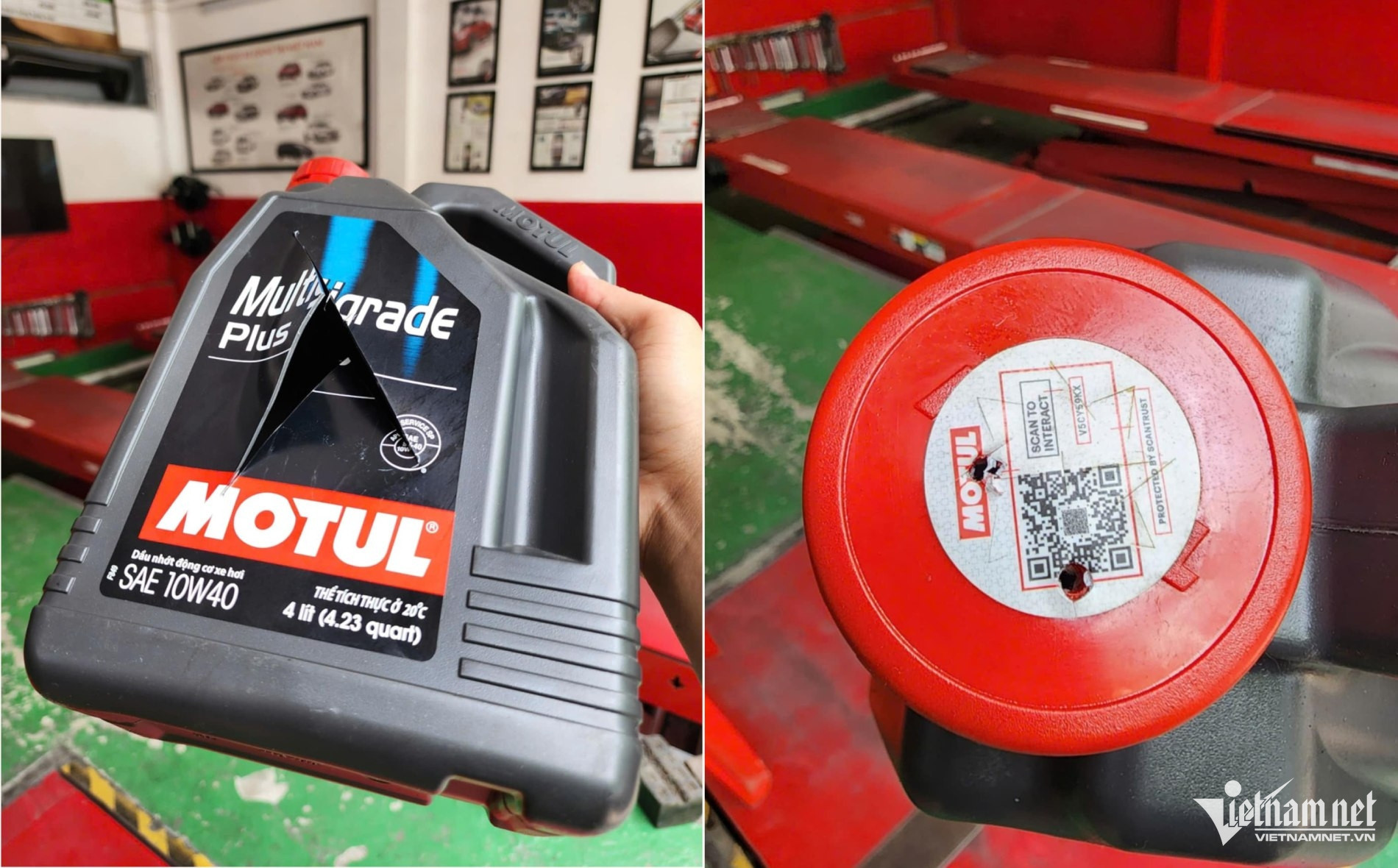
A series of busts targeting facilities producing and distributing counterfeit engine oil have left many car and motorcycle users alarmed. These fake oils are often sophisticatedly crafted, from packaging and labels to color, making them nearly indistinguishable to the naked eye.
On June 6, Nguyen Van Khanh, 32, and accomplices were caught purchasing low-quality oil and repackaging it into bottles branded as Castrol, Motul, Honda, and Yamaha, then selling them on e-commerce platforms like Shopee and Lazada. The case was uncovered by the HCM City Economic Police Department.
Since February 2024, this ring alone had sold over 220,000 counterfeit oil products, reaping illicit profits worth tens of billions of VND.
It is very easy to find engine oils sold at shockingly low prices, sometimes half the cost of genuine products. These oils are packaged in plastic bottles with labels mimicking reputable brands.
Engineer Le Hong Dai, director of DaiLinh Automotive Trading Development in Dan Phuong, Hanoi, said that using fake or low-quality oil will affect vehicle performance. Prolonged use can cause severe damage to components, sometimes beyond repair.
“Engine oil is like the ‘blood’ of the engine, responsible for lubrication, cooling, cleaning, and protecting moving parts during operation. Using recycled or substandard oil fails to provide lubrication, causing rapid wear on car parts. This leads to overheating, engine seizure, broken pistons, or burnt crankshaft bearings, while repairs cost up tens of hundreds of millions of VND,” he explained.
According to the expert, most fake oils are recycled from used oil or industrial chemicals not processed to standard. When used, these components can react chemically at high temperatures, forming sludge, carbon deposits, clogging oil filters, and even causing fires and explosions.
Moreover, fake oil lacks the ability to neutralize acids or clean metal surfaces, leading to sludge buildup, internal engine corrosion, and excessive toxic emissions, harming the environment.
Alarmingly, many users only notice the consequences of fake oil when their vehicles make strange noises, lose power, or show engine error codes. If these happen, it is necessary to have the oil replaced, but major components may need overhaul. In some cases, vehicles never regain stable performance due to extensive damage.
Car owners told to protect themselves
Most car and motorcycle users cannot distinguish genuine oil from fake or low-quality products. Many fall into the trap of buying suspiciously cheap oil online.
Nguyen Duc Thi, owner of Thi Lop, a tire and oil service chain in Hanoi, said counterfeiters often collect used genuine oil bottles from garages or oil change shops for 5,000-7,000 VND each, including caps. They then refill these bottles with recycled oil, reseal them with foil and labels that look authentic, and sell them back into the market.
According to Thi, the more reputable the brand, such as Castrol or Motul, the more likely it is to be counterfeited due to high sales volumes. In some cases, fake products may account for up to 50 percent of total products of the brand sold in the market.
“For regular vehicle users, distinguishing real from fake is difficult and they can be deceived. But professionals can spot irregularities with close inspection, such as uneven bottle surfaces, old bottles with new caps or labels, sediment at the bottle’s base, unusually thin foil seals, or blurry labels. Many brands now include QR codes for scanning to verify authenticity,” Thi told VietNamNet.
The owner of this auto service chain noted that for years, he has used only genuine oil with clear origin. He has told his workers to slash or puncture used oil bottles after use to prevent their reuse for counterfeiting. However, he acknowledged that such efforts by a few businesses are insufficient, requiring collective action.
Experts like Dai and Thi advise car and motorcycle users to only change oil at reputable showrooms or garages and to understand the appropriate oil for their vehicle (viscosity, standards, and change intervals) to avoid incorrect advice.
Most importantly, users should never opt for cheap oil or buy from e-commerce platforms without verifying quality. Likewise, they should avoid letting repair shops use unverified oil on their vehicles. Saving a few hundred thousand VND could lead to repair costs of tens of millions.
Hoang Hiep